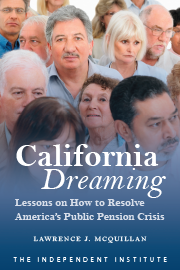In March, Chicago voters will decide whether to increase the city’s real estate title transfer tax, part of a referendum pushed by Mayor Brandon Johnson. But Chicago should consider the experience of San Francisco, now working to undo past mistakes on the same issue.
Proposition C
San Francisco’s office vacancy rate is a record-high 36%, as weekly office attendance is only 42%. To jump-start the downtown economy and boost housing construction, San Francisco Mayor London Breed proposed a ballot measure to eliminate real estate transfer taxes for qualifying office-to-residential conversions.
If voters approve Proposition C in March, it will grant a one-time transfer tax waiver for the first five million square feet of converted space in the city, provided that any such project is approved by the end of 2029 and all construction permits are received within three years of planning approval. The waiver doesn’t apply to subsequent sales of a property.
The measure marks a dramatic reversal from just four years ago.
In 2020, San Francisco voters approved Proposition I, which doubled the transfer tax rate on real estate sales of at least $10 million. The highest rate, now 6%, kicks in for property sales valued at $25 million or more—a threshold exceeded regularly in one of the country’s most expensive real estate markets, especially for conversion projects involving large office buildings.
Supporters of the 2020 increase claimed that the higher graduated tax rates would discourage speculative land grabs and home flipping, and that the additional tax revenue—estimated at $196 million per year—would “help those who have suffered most during the pandemic.”
Specifically, the San Francisco Board of Supervisors unanimously approved a nonbinding resolution to spend the new revenue on emergency rent relief and adding city-owned affordable housing. But transfer tax revenue is volatile and procyclical, meaning revenue is lowest when needs are greatest.
Despite the 2020 tax hike, San Francisco’s transfer tax revenue dropped a staggering 64% in fiscal year 2023 due to fewer real estate transactions and lower valuations as people left the city. Title transfer taxes are economically sensitive; thus, they are unreliable sources of revenue to ease the plight of the less fortunate.
Since 2020, most jurisdictions in California have maintained lower transfer tax rates than San Francisco, with the notable exception of Los Angeles, which imposed a massive increase in April 2023. The persistently higher transfer taxes in San Francisco send a clear message to housing investors that they can earn higher returns developing property elsewhere.
In 2020, the city controller warned that high transfer taxes will make San Francisco “less attractive economically as a place to live.” As it turned out, the controller was right.
Cyrus Sanandaji, a partner in Bay Area development firm Presidio Bay Ventures, said in October, “San Francisco still has too many self-imposed hurdles [to housing development],” including the city’s uncompetitive transfer tax. Sanandaji explained that banks, pension funds, and other housing investors in struggling San Francisco seek a minimum return on investment of 20% to justify the risk.
That is a heavy lift when the city immediately grabs 6% of high-value property sales. That’s $6 million on a $100 million sale. San Francisco would flourish the most if it permanently cut the city’s harmful transfer tax rates across the board to the state-mandated minimum of 0.11%.
Bring Chicago Home
Against the backdrop of Chicago’s record-high downtown office vacancy rate of 24% and weekly office attendance at only 45%, the Chicago City Council placed the Bring Chicago Home measure on the March ballot.
The referendum would change the city’s real estate transfer tax from its current flat rate to a graduated rate. It would increase the transfer tax rate by 167% on that part of a sale price between $1 million and $1.5 million, and hike rates by 300% for that part of a sale price exceeding $1.5 million.
Supporters of the measure claim that the extra tax proceeds, estimated at $100 million per year, would be used to provide permanent supportive affordable housing for people experiencing homelessness. But San Francisco has demonstrated that transfer taxes are an unstable source of funding for government programs over time.
Transfer taxes, especially graduated rates such as San Francisco’s—from 0.5% to 6%—make housing less attainable for first-time homebuyers, discourage improvements and adaptive reuse, decrease residential mobility, and chill real estate markets. They also disincentivize real estate owners, investors, and developers from building more housing, especially larger multifamily projects.
The tax hikes would hit downtown office buildings hardest. Such types of real estate can be prime candidates for residential conversions, resulting in fewer housing units long term.
To jump-start recovery, voters should oppose the Bring Chicago Home referendum and support Proposition C in San Francisco.










